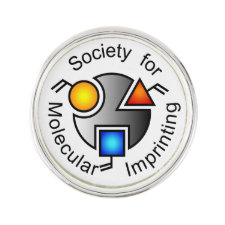
Authors: Luo W, Zhu LH, Yu C, Tang HQ, Yu HX, Li X, Zhang X
Article Title: Synthesis of surface molecularly imprinted silica micro-particles in aqueous solution and the usage for selective off-line solid-phase extraction of 2,4-dinitrophenol from water matrixes.
Publication date: 2008
Journal: Analytica Chimica Acta
Volume: 618
Issue: (2)
Page numbers: 147-156.
DOI: 10.1016/j.aca.2008.04.051
Alternative URL: http://www.sciencedirect.com/science/article/B6TF4-4SDPX8W-5/1/3492871acc22ce2e218d7ce7e103ec87
Abstract: Very severe reaction conditions are required in the conventional synthesis of molecularly imprinted polymers (MIPs), which is unfavorable to their applications in chemical separation and analysis. A simple surface molecular imprinting approach was developed to synthesize MIP-coated SiO2 micro-particles in aqueous solutions. The 1H NMR and UV-vis spectroscopic analysis indicated that via hydrogen bonding, the functional monomer (o-phenylenediamine) can associate with the target (template) 2,4-dinitrophenol (2,4-DNP), as a model compound of organic pollutants, to form a precursor in aqueous solution. The copolymerization of this precursor and the free monomer was performed in the aqueous suspension of surface modified SiO2 particles, leading to the formation of MIP-coated SiO2 micro-particles. The MIP-coated silica particles were characterized with FT-IR, TGA, and UV-vis solid-state reflection spectroscopy, and were further demonstrated to have high adsorption capacity, excellent selectivity and site accessibility for 2,4-DNP. The new absorbent was successfully used in solid-phase extraction (SPE) to selectively enrich and determine 2,4-DNP in aqueous samples. The experimental results indicated that the MIP-SPE column yielded recoveries higher than 92% with R.S.D. <2.8%, much better than the commercial C18-SPE column, which produced a recovery less than 30% with R.S.D. <3.0%
Template and target information: 2,4-dinitrophenol, 2,4-DNP
Author keywords: molecularly imprinted polymer, synthesis, Solid-phase extraction, 2,4-Dinitrophenol, high-performance liquid chromatography



Join the Society for Molecular Imprinting

New items RSS feed
Sign-up for e-mail updates:
Choose between receiving an occasional newsletter or more frequent e-mail alerts.
Click here to go to the sign-up page.
Is your name elemental or peptidic? Enter your name and find out by clicking either of the buttons below!
Other products you may like:
 MIPdatabase
MIPdatabase









